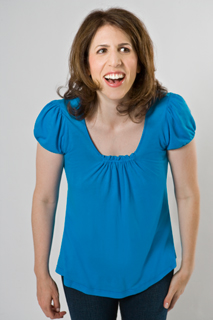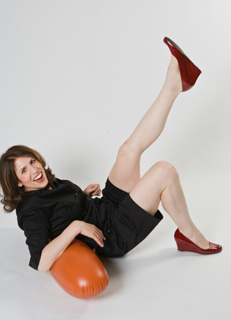Behind the Wheel…of the Wienermobile
Permanent link All Posts
Photo credit: Michael Weschler
Like many women, Robin Gelfenbien experienced bullying during her younger years. But Gelfenbien found redemption in the most unconventional of places: behind the steering wheel of Oscar Meyer’s Wienermobile.
During her freshman year at Syracuse University, Gelfenbien was endlessly taunted and harassed by a group of boys. Although she eventually reported them and the bullying stopped, the rest of her college experience was permanently tarnished. Committed to her education, she stayed at school but suffered from low self-esteem and retreated into a shell of her typically outgoing self.
Along came the Wienermobile, and with it, a new beginning. Recruited during her senior year of college, Gelfenbien knew she had been meant for the job. But never could she have predicted that the experience would impact her life as profoundly as it did.
Almost twenty years later, the Jewish comedian documents her story in the critically-acclaimed one-woman comedy show, My Salvation Has a First Name: A Wienermobile Journey, coming to Chicago in September as part of the Chicago Fringe Festival.

Photo credit: Michael Weschler
You’ve said that as a result of being bullied your freshman year, you “lost” your voice during the rest of college. Did you think the Wienermobile job would be the way to find yourself again?
I didn’t realize that I had lost my voice during college when I was driving the Wienermobile, but it’s obvious to me now. I basically shut down during those four years, and I thought the Wienermobile [job] would let me myself again, which is an enthusiastic, outgoing and silly goofball. Ever since I was a kid, I wanted to be on TV, which is why I went to the S.I. Newhouse School of Public Communications at Syracuse University. Unfortunately, I didn’t take advantage of that education the way I had hoped because of the bullying. … I wanted to be a Broadcast major, but the bullying made me afraid to do the campus TV or radio show, because I didn’t want to be harassed more.
So how did the job end up changing your life?
It allowed me to partially reclaim my old self, who was spirited, exuberant and funny. All of that had been quelled through college. The job allowed me the opportunity to find my voice again, because I was being paid to be myself, someone who is outgoing, enthusiastic, and loves being around people.
Comedy is a popular medium for delving into issues that are less than humorous. Why is it such a powerful art form for dealing with dark or difficult material?
They say that tragedy plus time equals comedy, and it’s so true. It has always helped me cope with whatever I’m going through. When you share a deeply personal story, the audience will come along for the ride, but if it gets to a point of being really heavy or uncomfortable, a quick joke or aside can lift that tension, and the audience will connect even more. I think comedy helps the audience relax and enjoy themselves rather than have to worry, “Is this person okay?” It helps show that you’ve gotten through something and even though it was painful, you’re okay now, and you can laugh about it. That gives people permission to laugh at our universal flaws and foibles and relate to your story even more.
You have quite a unique religious background. On your father’s side, you have a Jewish grandfather and Roman Catholic grandmother who raised your father in the Catholic faith. Your mother’s side of the family is Jewish. So how do you personally identify yourself?
I’m a very proud member of the tribe. I was raised Jewish, and I celebrated the High Holidays. I always fast on Yom Kippur. I get offended when someone says that I’m only half Jewish or implies that I’m not Jewish because my father is Catholic. I might have gone to mass a lot, but just to see my uncle [who is a Roman Catholic priest named Father Gelfenbien.] I consider myself 100% Jewish even though I had some unusual Christian influences in my life.
How does your Jewish identity play into your work or affect your comedy?
You know how stereotypically self-deprecating Jewish comedians tend to be. It definitely runs through everything I do. I never want to do things to make anyone else feel bad, but I could pick on myself all day long. I'm not perfect. I recognize how over the top I was to get the job [driving the Wienermobile] and I can laugh at it.
If there is one thing you want people leaving your show to keep in mind, what is it?
I want people to understand the power of people's words. What might seem like harmless teasing to some can have a profound impact on the person who's on the receiving end. It's an impact that, depending on the severity of the bullying, can last for many years.
My Salvation Has a First Name: A Wienermobile Journeywill be playing a limited run in Chicago, with performances Sept. 3-5, 10 and 11. For tickets and information about the Chicago Fringe Festival, visit www.chicagofringe.org. Information about Robin Gelfenbien and her show can be found at www.wienermobileshow.com.



.jpg)



